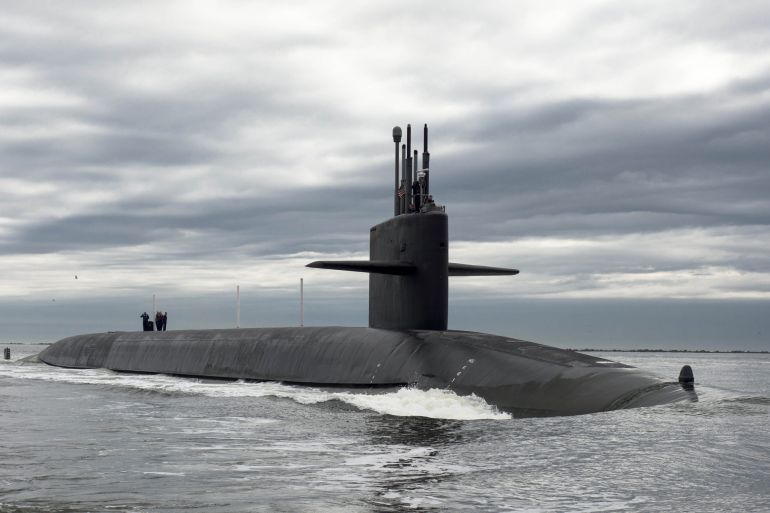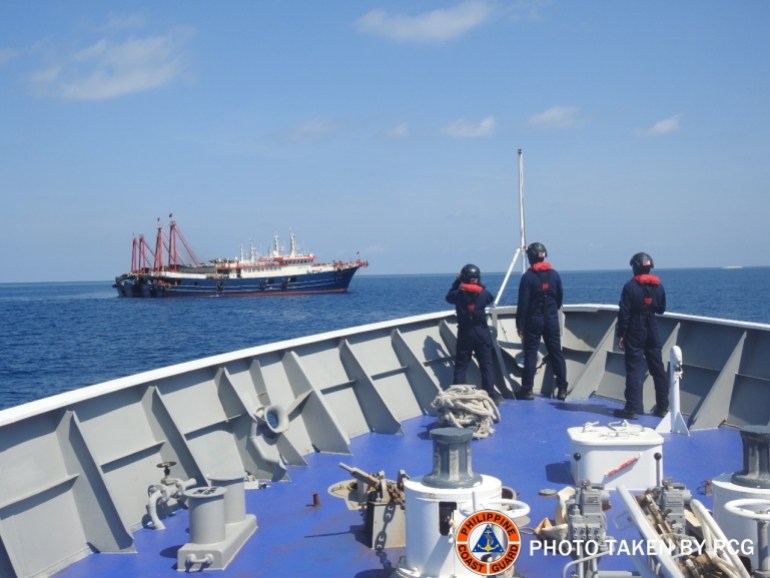US, UK and Australia agree new Indo-Pacific security pact
Australia will get nuclear-powered submarines as part of the deal, dubbed AUKUS, which is seen as an attempt to counter China.

Australia, the United States and the United Kingdom have announced a new trilateral security alliance, including a joint effort to help the Australian military acquire nuclear-powered submarines, in an apparent attempt to counter China.
The leaders of all three countries unveiled the alliance – dubbed AUKUS – on Wednesday. They stressed that the submarines would be nuclear powered, and not carry nuclear weapons.
Keep reading
list of 4 itemsChina condemns US warship transit of Taiwan Strait
Navies of 21 countries kick off US-led drills in Southeast Asia
UK to permanently deploy two warships in Asia Pacific
Australia is a signatory to the Treaty on the Non-Proliferation of Nuclear Weapons (NPT).
Joined virtually by Australian Prime Minister Scott Morrison and his UK counterpart Boris Johnson, US President Joe Biden said the three nations were taking a “historic step” to deepen their cooperation.
“We all recognise the imperative of ensuring peace and stability in the Indo-Pacific over the long term,” Biden said from the White House.
“We need to be able to address both the current strategic environment in the region and how it may evolve because the future of each of our nations – and indeed the world – depends on a free and open Indo-Pacific enduring and flourishing in the decades ahead.”
The three leaders did not mention China explicitly in their remarks on Wednesday.
Chinese foreign ministry spokesman Zhao Lijian condemned the new alliance as an “extremely irresponsible” threat to regional stability.
The three countries were “severely damaging regional peace and stability, intensifying an arms race, and damaging international nuclear non-proliferation efforts,” Zhao told a regular press briefing.
A spokesperson for the Chinese embassy in Washington, DC, also said the three countries should “shake off their Cold War mentality and ideological prejudice”, the Wall Street Journal and the Reuters news agency reported.
The spokesman denounced what he called “exclusionary blocs” targeting the interests of other countries.
‘Safe, more secure’
Australia’s Morrison said the newly announced partnership would “deliver a safer and more secure region” and ultimately benefit all.
“Let me be clear: Australia is not seeking to acquire nuclear weapons or establish a civil nuclear capability,” he added. “And we will continue to meet all our nuclear non-proliferation obligations.”
Australia said it intended to build eight nuclear-powered submarines under the agreement.
“It is impossible to read this as anything other than a response to China’s rise, and a significant escalation of American commitment to that challenge,” Sam Roggeveen, the director of the Sydney-based Lowy Institute’s international security programme, wrote in response to what he said was an “extraordinary” announcement. “The United States has only ever shared this technology with the United Kingdom, so the fact that Australia is now joining this club indicates that the United States is prepared to take significant new steps and break with old norms to meet the China challenge.”
Roggeveen added that while he had been sceptical about the idea that the US would enter a ‘Cold War’ with China, “this announcement is significant evidence that it is indeed prepared to take such a momentous step”.
The announcement comes amid growing competition between Beijing and Washington and its allies in the Asia Pacific, particularly over Taiwan and the disputed South China Sea, which China claims almost in its entirety amid rival claims by several other nations including Vietnam, the Philippines and Malaysia.
Australia has also seen its ties with China deteriorate sharply amid disputes over the coronavirus pandemic, trade and concern in Canberra about Chinese political influence operations.
“The reason for all of this is clear – China,” Tom Tugendhat, a legislator with the UK’s ruling Conservative party who chairs parliament’s foreign affairs committee, wrote on Twitter. “After years of bullying and trade hostility, and watching regional neighbours like the Philippines see encroachment into their waters, Australia didn’t have a choice. And nor did the US or UK.”

In recent years, China has built artificial islets in the South China Sea that it has turned into military outposts, and deployed its coast guard and maritime militia. In January, it passed a law allowing the coast guard to fire on foreign vessels.
Tensions have also risen across the Taiwan Strait, where there have been almost daily incursions by Chinese military aircraft, while an arms race is building in the Koreas. On Wednesday, North Korea tested a new ballistic missile amid stalled talks on denuclearisation, and South Korea tested its own submarine-launched ballistic missile (SLBM) just hours later.
The United States has been operating regular ‘freedom of navigation’ operations in the South China Sea and near Taiwan, while the UK Navy has also stepped up activity in the region. The aircraft carrier, HMS Queen Elizabeth, is in the region and held drills with Japan’s defence force last month after sailing through the South China Sea earlier.
‘Echoes of gunboat diplomacy’
An unidentified US official told reporters on Wednesday that AUKUS was “not aimed at any one country”.
“This is about a larger effort to sustain the fabric of engagement and deterrence in the Indo-Pacific,” the official said.
Einar Tangen, a political analyst based in Beijing, told Al Jazeera the new pact had “echoes of gunboat diplomacy going back to the colonial era”.
The US and Australia have already stepped up defence ties as part of the so-called Quad, which also includes India and Japan. That group is due to meet next week in the US.

A joint statement by the three nations said the US and the UK would use their expertise to produce the submarines for Australia at the earliest date possible.
“We will promote deeper information and technology sharing,” the statement said. “We will foster deeper integration of security and defence-related science, technology, industrial bases, and supply chains. And in particular, we will significantly deepen cooperation on a range of security and defence capabilities.”
Australia signed a multi-billion dollar contract to buy French diesel-powered submarines in 2016.
France expressed its regret at the announcement and the ending of the deal.
“The American choice, which leads to the removal of an ally and a European partner such as France from a longstanding partnership with Australia, at a time when we are facing unprecedented challenges in the Indo-Pacific region, whether on our values or on respect for multilateralism based on the rule of law, marks an absence of coherence that France can only observe and regret,” Foreign Minister Jean-Yves Le Drian and Minister for the Armed Forces Florence Parly said in a joint statement.